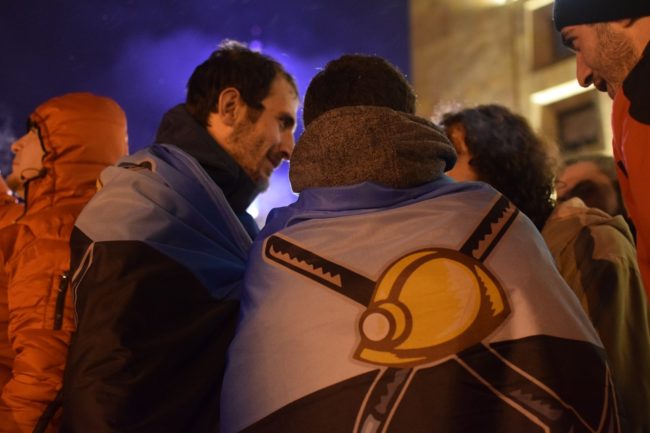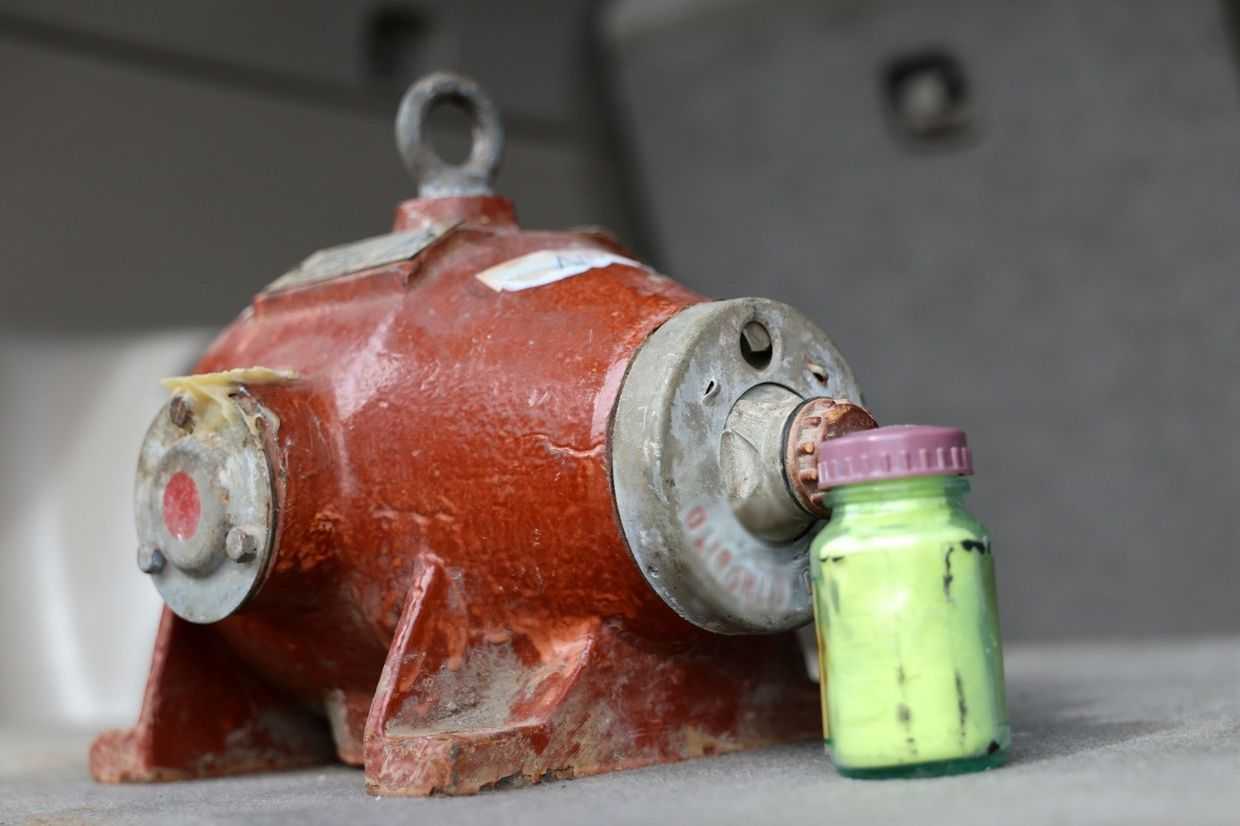

 The Mindeli coal shaft in Tkibuli, central Georgia, is to be shut down pending the results of an official investigation after four miners were killed and six more wounded on Monday. According to a preliminary report from the Interior Ministry, the incident was caused by a methane gas explosion leading to the collapse of a tunnel roof.
The Mindeli coal shaft in Tkibuli, central Georgia, is to be shut down pending the results of an official investigation after four miners were killed and six more wounded on Monday. According to a preliminary report from the Interior Ministry, the incident was caused by a methane gas explosion leading to the collapse of a tunnel roof.
Four of those injured were transported to Tbilisi and are currently being treated at Khechinashvili University Hospital Burn Centre. The four dead were aged from 30–57 years old.
Ruslan Butskhrikidze, a member of the Initiative Group of Tkibuli Miners, told OC Media that miners in Tkibuli were in shock. ‘We expected it to happen again, what happened in April, as nothing has changed and no one has been punished since the last incident’, Butskhrikidze said.
On 5 April, a coal shaft collapse in Tkibuli killed six miners and injured three. Following the incident, a group of miners demanded that Saknakhshiri halt their operations until safety conditions were improved. Four miners were also killed in the mine in May 2017, which led a small group of activists to attempt to block Tbilisi’s central Rustaveli Avenue in protest.
Prime Minister Mamuka Bakhtadze announced on Monday that an investigation was under way and vowed that ‘all those responsible will be punished’. ‘The state cannot allow its own citizens’ lives and health to be endangered’ Bakhtadze said, announcing that the mine would be closed until a criminal investigation including an ‘extensive international engineering study’ was concluded.
The Prime Minister promised the government would cover workers’ salaries during the investigation, and declared 16 July a national day of mourning.
Deputy Economy Ministers Giorgi Cherkezishvili and Genadi Arveladze travelled to Tkibuli following the incident, 1TV reported.
In a statement on Monday, the Georgian Industrial Group (GIG) said that ‘due to the specific character of the Tkibuli mines’, no solution had been found to make them ‘entirely safe’. The company said they were prepared to hand over the mines to the Georgian Government.
‘Ultimate closure’
The Prime Minister’s statement was supported by a number of MPs as well as President Giorgi Margvelashvili, who cancelled some of the celebratory events scheduled for a state visit by Italian President Sergio Mattarella. ‘The fact that 11 people have died and 10 been injured in 2018 means that the state does not adequately respond to such incidents’, IPN quoted Margvelashvili as saying. ‘Everyone should take responsibility and we must take steps to ensure the right to life in workplaces’.
Deputy Health Minister Tamila Barkalaia confirmed to local media that the ‘ultimate closure’ of the Mindeli mine was ‘being considered’.
New Prosecutor General Shalva Tadumadze, who was confirmed by parliament on Monday, promised his office would oversee these investigations and if any violations were found, he said the ‘prosecution’s position will be the strictest’.
Parliamentary Speaker Irakli Kobakhidze blamed the ‘hardline position [of the] previous government’s leadership’ towards ‘needed changes’ to labour safety policy — in an apparent attack on former Prime Minister Giorgi Kvirikashvili. Kobakhidze also berated the previous ruling party, the United National Movement (UNM) for their ‘libertarian approach’ to labour safety. ‘This position directly contradicts the main value on which we base our politics — the person’, Kobakhidze said.
According to regional Police Head Besik Amiranashvili, ‘all members of the company responsible for the Mindeli mine’ were being questioned by police, adding that ‘all 25 [of the company’s mines] will be sealed until the end of the investigation’. Among those being questioned according to TV Imedi was the CEO of Saknakhshiri Jambul Jakheli. Saknakhshiri employs roughly 1,500 workers, mostly residents of Tkibuli.
The Interior Ministry said it was investigating the incident under article 240 of the Criminal Code, which deals with violations of safety regulations. The Health Ministry’s Labour Inspection Department is also investigating the incident, according to IPN. Saknakhshiri’s Director Jambul Jakheli confirmed this, telling Rustavi 2 that ‘it looks like the previous incident’, which occurred several months ago.
Saknakhshiri is owned by the Georgian Industrial Group (GIG), a company with holdings in energy, natural gas, and real estate. The General Director of GIG, Davit Bezhuashvili, was an MP from 2004–2016 for UNM. His brother, Gela Bezhuashvili, Georgia’s Foreign Minister from 2005–2008, is a member of GIG’s Council of Directors.
‘Problematic’ response
According to the Georgian Trade Unions Confederation (GTUC), 29 people were killed and 24 seriously injured in occupational accidents in 2018 so far, including 11 miners. Data obtained from Georgia’s Interior Ministry showed that over eight years from 2010–2017, 359 people were killed and 984 injured in accidents at work in Georgia.
GTUC Deputy Head Tamaz Dolaberidze told OC Media that the state’s response to such incidents was ‘problematic’, as no updates on investigations launched after accidents were made available to the public, and no individuals were identified or held accountable.
Dolaberidze also criticised the Interior Ministry’s exclusive access to the sites of accidents — since 2006, the trade unions’ technical inspectors have been unable to conduct forensic examinations of sites within 24 hours of an accident occurring. ‘I highly doubt there are labour safety experts present at the site, only police investigators’, Dolaberidze told OC Media.
He said that ‘until the practice of investigating incidents becomes standardised’, the government would not be able to make changes to labour safety policies. ‘The government does not have a central course that ministers and other agencies would be aligned to’, said Dolaberidze.
Dolaberidze said that halting operations in the Mindeli mine was not a good solution, as it would be a ‘social catastrophe’ for Tkibuli. ‘The coal mining industry is dangerous, and Tkibuli coal mines, compared to those in Ukraine or Belarus, are even more dangerous, with risks including methane explosions, coal dust explosions, mine bumps, endogenous and exogenous fires, etc.’, Dolaberidze said. What’s needed, according to him is to ‘minimise risks by implementing modern safety systems’.
On 7 March, Parliament adopted a new labour law that giving labour inspectors the right to access and examine safety conditions in enterprises in hazardous sectors without prior warning, along with the ability to fine them for any violations.
Earlier in July, the Health Ministry announced they would begin inspecting particularly dangerous enterprises from 1 August, and that the list of hazardous sectors would be expanded in the meantime. Once identified, employers in these sectors will be required to register as such.
The new law also obliges large employers (with more than 20 employees) to hire at least one labour safety inspector for the workplace.









